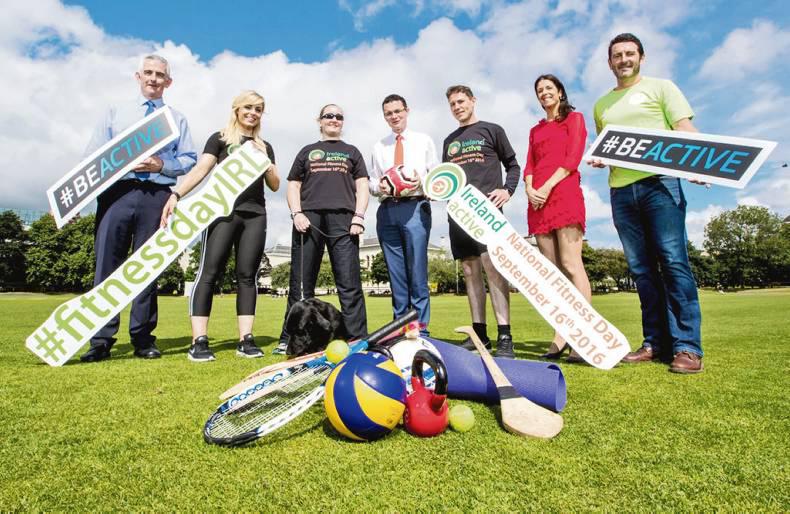Your body is an unfinished building project
The National Dairy Council (NDC) is currently running a campaign called Powered By Dairy, which is fronted by Rob and Dave Kearney who were filmed for the campaign trying out new sports and learning about training and fitness regimes.
“Our aim is to engage with people who want to get off the couch and start to work on their fitness,” says Zoe Kavanagh, chief executive of the NDC, “as well as those who are already involved in exercise training at any level or who are taking part in challenges, competitions or playing on teams.”
Highlighting the role of milk and dairy in sports nutrition, the campaign message is that: “Your body is an unfinished building project.”
“This is based on the fact that bones are constantly being remodelled, with old bone broken down and replaced by new bone. Also, each day, 1-2% of our muscles mass is broken down and rebuilt. Milk is a convenient, versatile drink that can assist.”
Did you know?
All sick children in receipt of Domiciliary Care Allowance (DCA) are to get a medical card without a means test. To date, one in three haven’t had one.National Fitness Day will be held on Friday 16 September and gyms will hold “come and try” sessions free of charge that day. See www.nationalfitnessday.ie.The Mind, Body, Spirit and Wellness Festival will take place at the RDS, Dublin, from 29-31 October. See www.mindbodyspirit.ie.80% of women under the age of 40 who have had heart attacks are smokers. Stopping smoking is the single most important thing you can do to prevent heart disease.One in six couples are currently experiencing fertility issues. In half these cases the problem is on the male side.A 2015 NUI Galway survey of 2,000 nursing students across six medical schools found that almost nine out of 10 trainee nurses planned to leave Ireland when they qualified. 64% of Irish mothers start breastfeeding but the figure falls to 33% at six weeks and only 16% are still breastfeeding when their baby is six months oldFree blood pressure checks will be available round the country from the Irish Heart Foundation’s new mobile health unit. Get yours checked to see if it is a healthy level. New superbug to battle in hospitals
A review by HIQA into antimicrobial resistance found that while MRSA and clostridium difficile rates have fallen in Ireland, the incidence of multi-drug resistance among gram-negative organisms – which can cause a number of different infection types including urinary tract and bloodstream infections – is increasing.
“A number of these gram-negative bacteria are highly resistant and are associated with serious infections,” says Sean Egan of HIQA.
“Unlike MRSA, patients who carry these bacteria cannot be treated to eradicate them from their bodies. Antimicrobial prescribing and infection control practices in hospitals and, equally, in community health and social care settings, needs to be of a high standard to fully address this emerging problem.”
A new national plan is needed to deal with this situation, he says.
Antibiotics taken inappropriately can lead to them being ineffective over time.
While there is a drop of 6% in consumption of antibiotics in the EU, there is a persistent lack of awareness of their effects.
44% of Irish people have taken antibiotics in the last 12 months, according to an EU survey.
Get tax back on medical expenses
Tax relief at 20% can be claimed on un-reimbursed medical expenses (one not reimbursed by a health insurer) and on qualifying non-routine dental expenses, eg crowns.
If you and your family spend €500 a year on GP visits and prescriptions and other medical expenses, you could claim back €100 by filling out Form Med 1. See www.revenue.ie for a list of what treatments qualify.
You have to deduct any payments you received say from a health insurance policy but once they are deducted you can get tax relief at 20% on the remaining balance. Remember to keep the receipts for six years.
A taxback.com survey recently showed that only one in five Irish people is claiming this relief.
Men and their friendships
Men’s friendships with other men tend to drop away after the age of 30 and they become more dependent on their female partner for support, according to the Samaritans. However, it is important that men look after their friendships.
A report by the Samaritans has looked at men, suicide and society and considered men’s personal mid-life relationships and, in particular, the difference between male and female relationships.
Women continue to maintain close, nurturing friendships with women as they age, but men don’t turn to male friends for emotional support. This can mean experiencing loneliness if a relationship with a partner breaks down.
“We want to encourage men to nurture their friendships so that they can talk and listen to each other when times are tough,” says Samaritans director, Catherine Brogan. “Being able to talk to someone you trust can make a huge difference to how you feel.”
Anyone can contact Samaritans, whatever you’re going through. Call 116 123 FREE from any phone (this number will not appear on your phone bill).
See www.samaritans.ie for more information.
Happy birthday Sudocrem
It is 85 years since Sudocrem was developed by Irish pharmacist Thomas Smith in Cabra in 1931. Now more than 34.5m pots of Sudocrem are sold worldwide every year and they are all produced in Baldoyle by Forest Tosare Ltd.
To celebrate the birthday, Sudocrem are running the Baby Changing Room Awards 2016.
Know any venues that have really great baby changing facilities? Visit www.sudocrem.ie to cast your vote. Closing date is 30 September 2016 and all votes will be entered into a draw.
Folic acid focus
Are you at an age where you could become pregnant, even if you’re not planning one? Safefood is encouraging all women in this bracket to take folic acid daily as it is the best way to reduce the risk of having a baby with a neural tube defect (NTD) like spina bifida. Only one in four women take folic acid before pregnancy.
“Women should start folic acid before they become pregnant and not wait until they are planning a pregnancy or until after they become pregnant,” says Prof Michael Turner of the Coombe Hospital. “Taking a 400mg every day can potentially prevent two thirds of neural tube defects every year.”
Your body is an unfinished building project
The National Dairy Council (NDC) is currently running a campaign called Powered By Dairy, which is fronted by Rob and Dave Kearney who were filmed for the campaign trying out new sports and learning about training and fitness regimes.
“Our aim is to engage with people who want to get off the couch and start to work on their fitness,” says Zoe Kavanagh, chief executive of the NDC, “as well as those who are already involved in exercise training at any level or who are taking part in challenges, competitions or playing on teams.”
Highlighting the role of milk and dairy in sports nutrition, the campaign message is that: “Your body is an unfinished building project.”
“This is based on the fact that bones are constantly being remodelled, with old bone broken down and replaced by new bone. Also, each day, 1-2% of our muscles mass is broken down and rebuilt. Milk is a convenient, versatile drink that can assist.”
Did you know?
All sick children in receipt of Domiciliary Care Allowance (DCA) are to get a medical card without a means test. To date, one in three haven’t had one.National Fitness Day will be held on Friday 16 September and gyms will hold “come and try” sessions free of charge that day. See www.nationalfitnessday.ie.The Mind, Body, Spirit and Wellness Festival will take place at the RDS, Dublin, from 29-31 October. See www.mindbodyspirit.ie.80% of women under the age of 40 who have had heart attacks are smokers. Stopping smoking is the single most important thing you can do to prevent heart disease.One in six couples are currently experiencing fertility issues. In half these cases the problem is on the male side.A 2015 NUI Galway survey of 2,000 nursing students across six medical schools found that almost nine out of 10 trainee nurses planned to leave Ireland when they qualified. 64% of Irish mothers start breastfeeding but the figure falls to 33% at six weeks and only 16% are still breastfeeding when their baby is six months oldFree blood pressure checks will be available round the country from the Irish Heart Foundation’s new mobile health unit. Get yours checked to see if it is a healthy level. New superbug to battle in hospitals
A review by HIQA into antimicrobial resistance found that while MRSA and clostridium difficile rates have fallen in Ireland, the incidence of multi-drug resistance among gram-negative organisms – which can cause a number of different infection types including urinary tract and bloodstream infections – is increasing.
“A number of these gram-negative bacteria are highly resistant and are associated with serious infections,” says Sean Egan of HIQA.
“Unlike MRSA, patients who carry these bacteria cannot be treated to eradicate them from their bodies. Antimicrobial prescribing and infection control practices in hospitals and, equally, in community health and social care settings, needs to be of a high standard to fully address this emerging problem.”
A new national plan is needed to deal with this situation, he says.
Antibiotics taken inappropriately can lead to them being ineffective over time.
While there is a drop of 6% in consumption of antibiotics in the EU, there is a persistent lack of awareness of their effects.
44% of Irish people have taken antibiotics in the last 12 months, according to an EU survey.
Get tax back on medical expenses
Tax relief at 20% can be claimed on un-reimbursed medical expenses (one not reimbursed by a health insurer) and on qualifying non-routine dental expenses, eg crowns.
If you and your family spend €500 a year on GP visits and prescriptions and other medical expenses, you could claim back €100 by filling out Form Med 1. See www.revenue.ie for a list of what treatments qualify.
You have to deduct any payments you received say from a health insurance policy but once they are deducted you can get tax relief at 20% on the remaining balance. Remember to keep the receipts for six years.
A taxback.com survey recently showed that only one in five Irish people is claiming this relief.
Men and their friendships
Men’s friendships with other men tend to drop away after the age of 30 and they become more dependent on their female partner for support, according to the Samaritans. However, it is important that men look after their friendships.
A report by the Samaritans has looked at men, suicide and society and considered men’s personal mid-life relationships and, in particular, the difference between male and female relationships.
Women continue to maintain close, nurturing friendships with women as they age, but men don’t turn to male friends for emotional support. This can mean experiencing loneliness if a relationship with a partner breaks down.
“We want to encourage men to nurture their friendships so that they can talk and listen to each other when times are tough,” says Samaritans director, Catherine Brogan. “Being able to talk to someone you trust can make a huge difference to how you feel.”
Anyone can contact Samaritans, whatever you’re going through. Call 116 123 FREE from any phone (this number will not appear on your phone bill).
See www.samaritans.ie for more information.
Happy birthday Sudocrem
It is 85 years since Sudocrem was developed by Irish pharmacist Thomas Smith in Cabra in 1931. Now more than 34.5m pots of Sudocrem are sold worldwide every year and they are all produced in Baldoyle by Forest Tosare Ltd.
To celebrate the birthday, Sudocrem are running the Baby Changing Room Awards 2016.
Know any venues that have really great baby changing facilities? Visit www.sudocrem.ie to cast your vote. Closing date is 30 September 2016 and all votes will be entered into a draw.
Folic acid focus
Are you at an age where you could become pregnant, even if you’re not planning one? Safefood is encouraging all women in this bracket to take folic acid daily as it is the best way to reduce the risk of having a baby with a neural tube defect (NTD) like spina bifida. Only one in four women take folic acid before pregnancy.
“Women should start folic acid before they become pregnant and not wait until they are planning a pregnancy or until after they become pregnant,” says Prof Michael Turner of the Coombe Hospital. “Taking a 400mg every day can potentially prevent two thirds of neural tube defects every year.”






 This is a subscriber-only article
This is a subscriber-only article










SHARING OPTIONS: